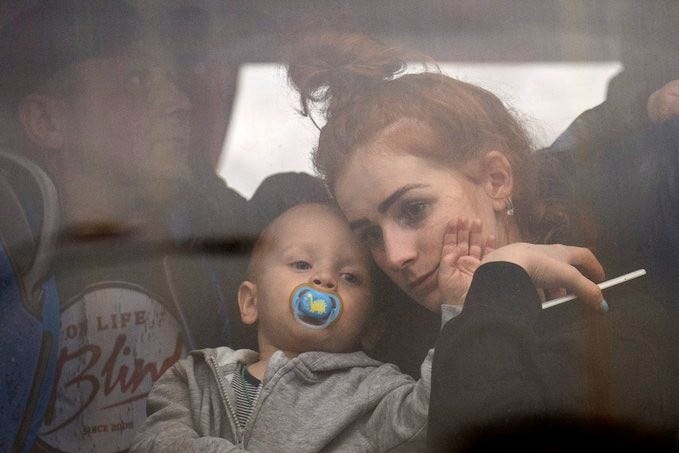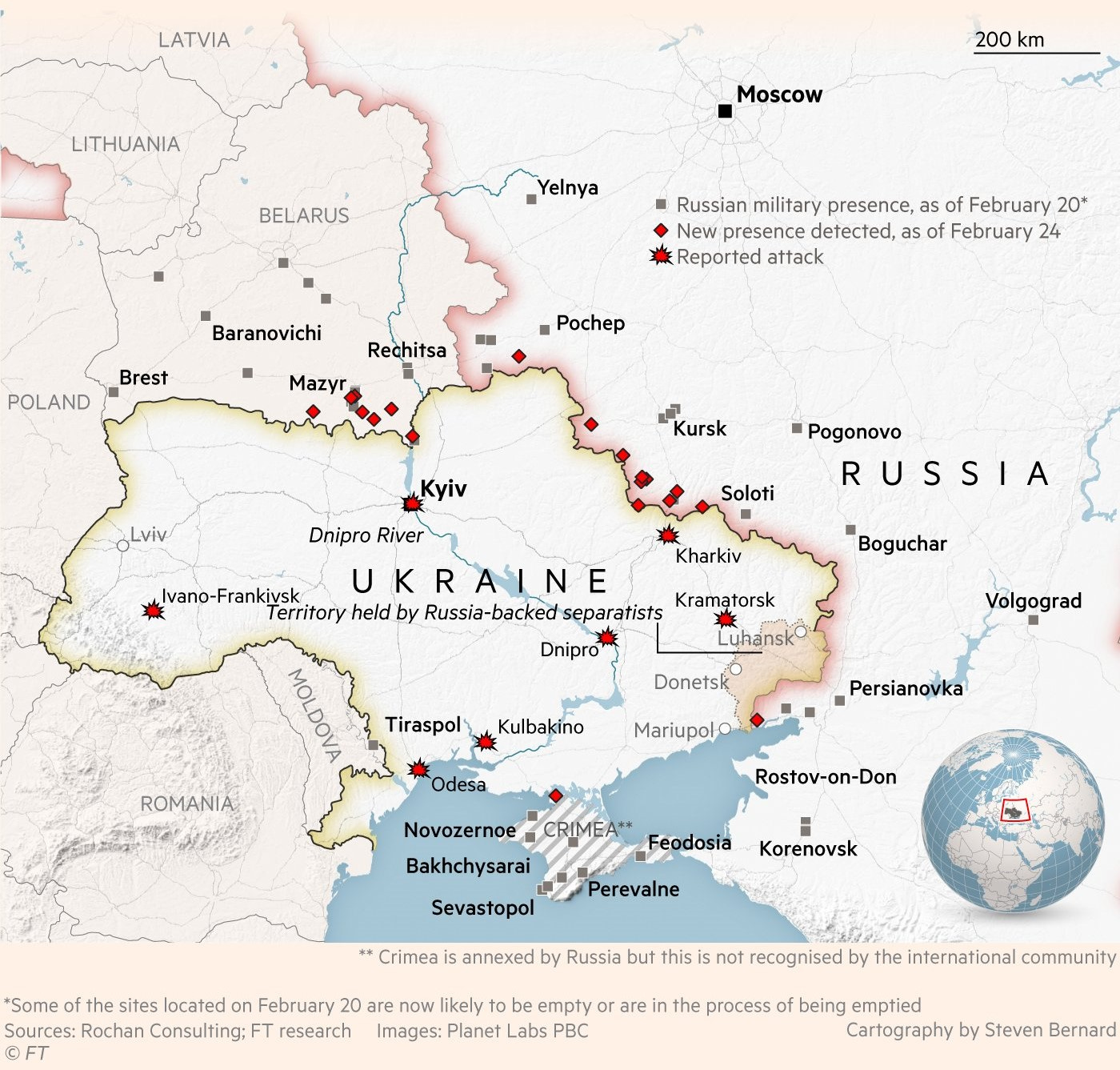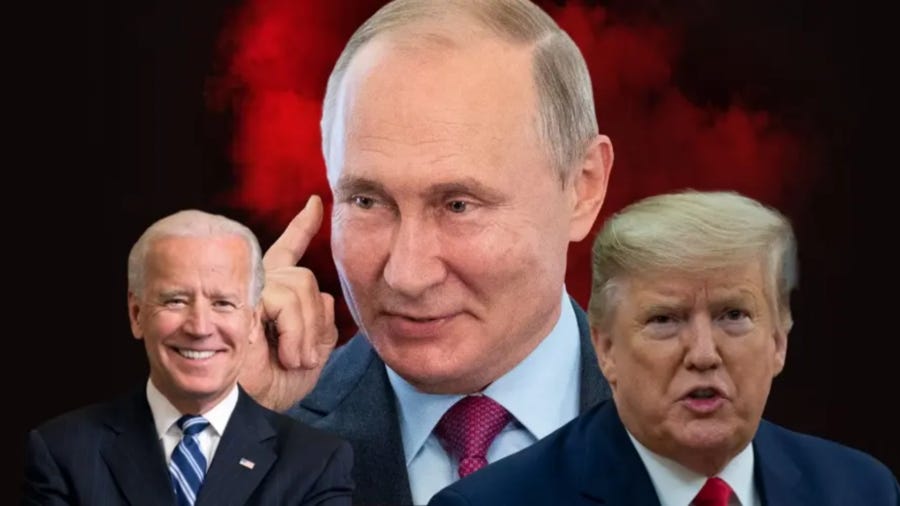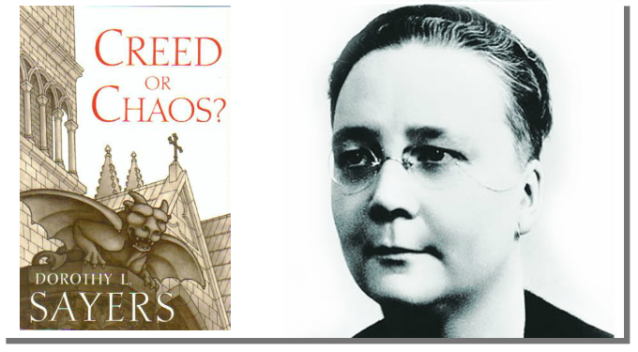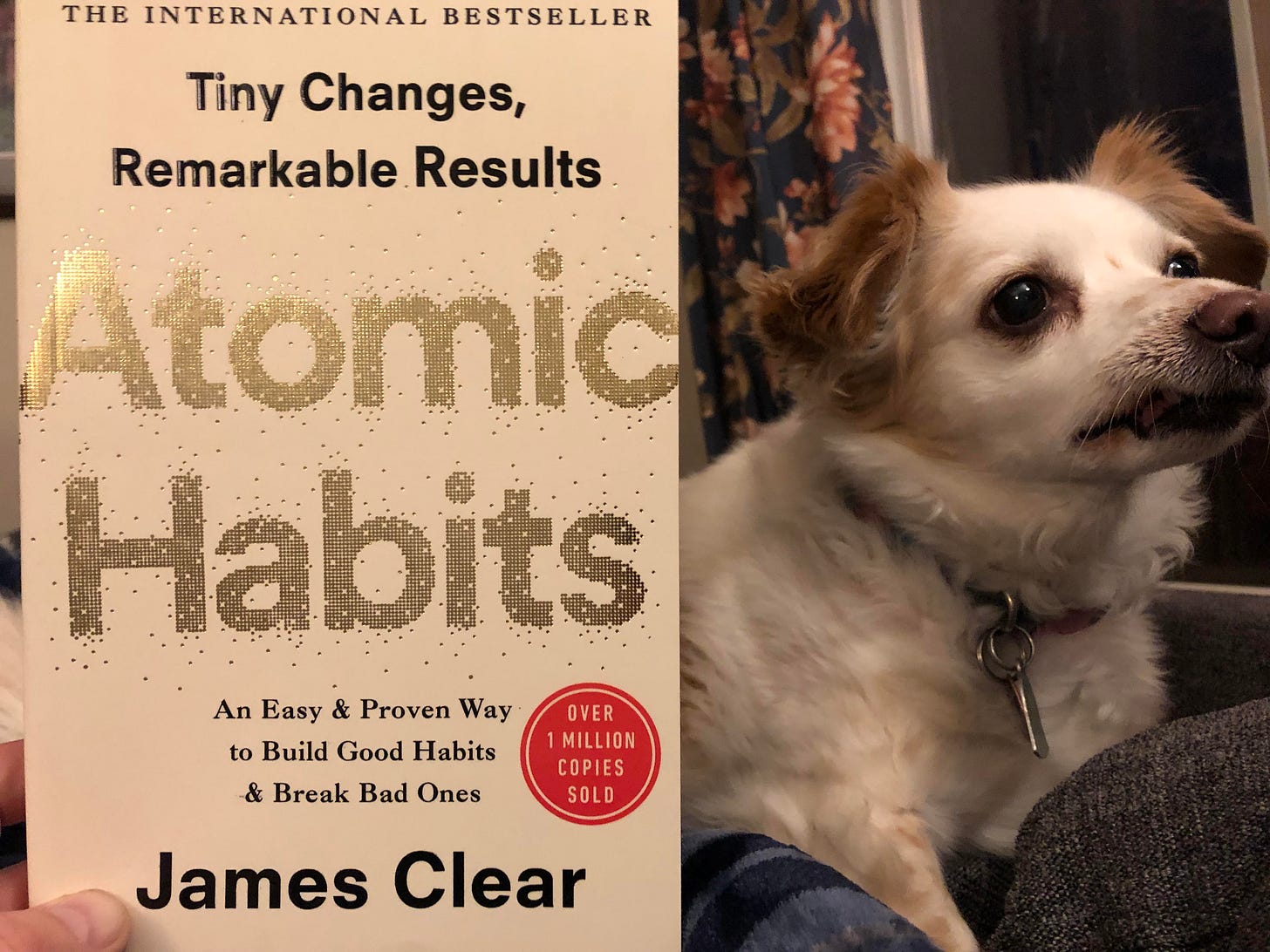From Russia with Ugh
Vladimir Putin's Disgusting Nationalism
Dear Reader,
No matter how awful a week any of us has had, the people of Ukraine have had one worse. In an effort to make sense of all that’s transpired in the past few days (as well as remind ourselves that war is hell), I’ve devoted this week’s feature to trying to understand what’s behind the Russian invasion, doing so with an interview of a friend who lived 17 years in the Former Soviet Union. I hope it’s a helpful and heartfelt summary.
On the lighter side of things, I enjoyed hearing from this paid subscriber who received her official Second Drafts T-shirt last week:
“You know I only wanted the tee for the cute drawing of Peaches. In fact I only peruse your posts so I can see Peaches weekly (OK, that's a lie). But now Peaches has a new fan. You see, your package arrived at the same time as a Chewy box. After I opened your package, I sat the unfolded tee atop the Chewy box. Rocket Cat was already rubbing all over the Chewy box as is his wont, but one glimpse of Peaches sent his affections in a whole new direction. He spent the next couple hours curled up and napping atop Peaches. Could be true love. Between Peaches and your tagline, this is now my favorite tee shirt.”
I let Peaches know the good news and she was pretty excited (it’s not everyday one is admired by a completely different species).
Pray for the people of Ukraine and Russia. And as always, thanks for reading Second Drafts.
Craig
P.S.: As a reminder, you’re welcome and encouraged to email me directly with feedback, ideas, links, etc. at cmdunham [at] gmail [dot] com. Just know that, unless you specifically tell me not to, I may quote you here (though it will always be anonymously).
P.P.S.: Become a Second Drafts paid subscriber at just $5/month. Subscribe today, and receive tomorrow’s in-depth monthly book review on Fools Crow by James Welch. Just click the button below, select your preferred plan and pay with a credit or debit card, and enjoy!
Hot Takes
“‘America's Got Talent’ Singer Jane ‘Nightbirde’ Marczewski Dies at 31 after Cancer Battle.” - For the sake of brevity (as well as a definite need for inspiration), I’ve got just one Hot Take for us this week, but it’s one you need, trust me.
Perhaps you heard about Jane Marczewski, the singer also known as Nightbirde, who lost her battle with cancer last weekend. If not, here are the basics:
“Jane ‘Nightbirde’ Marczewski, the singer whose breakout performance as a contestant on the latest season of "America's Got Talent" made her a fan favorite, died Saturday at age 31 after battling cancer for four years.
‘Your voice, your story, and your message touched millions,’ read a statement from the show shared with USA TODAY. ‘Nightbirde will always be a member of the AGT family. Rest In Peace, Jane.’
Nightbirde's family confirmed her death ‘with the deepest heartache.’
‘We, her family, are devastated by her passing and unimaginable loss. Many remember her from America’s Got Talent, where she performed her song ‘It’s OK’ and inspired millions of people around the globe with her messages of faith and never giving up,’ the family said Monday in a statement to USA TODAY:
‘Those who knew her, enjoyed her larger-than-life personality and sense of humor. She had a witty joke for every occasion – even if the joke was on her. Her lasting legacy will be the gift of hope she gave to so many through her music and the strength she found in Jesus.’”
That last part about Jesus was what AGT fans may not have heard, but need to hear. Writing in an article in The Gospel Coalition this summer, Angela Davis elaborated:
“Why is this unlikely voice the one we need to hear right now? In her words, Nightbirde gives the answer: ‘I am so much more than the bad things that happen to me.’ What is her hope despite her circumstances? How can she declare ‘It’s OK’ when it clearly isn’t?
America is captivated because hope and joy are not natural responses when life falls apart. So, where does Nightbirde’s hope originate? From a mysterious place that an NBC talent show is unlikely to explore: God. In an interview, Nightbirde said:
‘I believe that God can heal in one instant. I also believe that ‘no good thing does he withhold,’ so there was something God was growing in the field that is me, and if God had pulled up all of this hardship too soon, it would have also pulled up all these miracles he did in my spirit.’”
Davis concluded:
“America is fascinated with Nightbirde not simply because her story is compelling, but because she seems to possess something elusive we all want. Or rather, someone: the God who knows our pain, meets us in our pain, and redeems our pain. With this God, we too can have a hope that allows us to sing, along with Nightbirde, the unlikeliest of refrains in a world of sickness and death: ‘It’s OK.’”
Not much I can add to that, other than to say you’re missing out if you haven’t seen this woman’s AGT performance or read her beautiful words on her blog.
I’m not crying; you’re crying. Glory to God.
From Russia with Ugh
Like many this week, I've been following what is now actual war between Russia and Ukraine. Supplementing and balancing various news outlets, I’ve benefited from several independent sources, one of which has been Global Scholar David Koyzis. On his blog, Notes from a Byzantine Calvinist, Koyzis posted this yesterday. An excerpt:
“This morning the world woke up to the news that Vladimir Putin's Russia had launched a full-scale invasion of Ukraine. This followed eight years of Russia whittling away at Ukraine's territory, first annexing the largely Russian-speaking Crimean Peninsula and then supporting separatists in the eastern provinces of Luhansk and Donetsk. Western countries have imposed sanctions, but Russia has persisted in its ambitions despite these. We can expect new sanctions to be imposed, but Russia is a huge country with ample natural resources, and it has been preparing for this moment for some time. Economic sanctions might deter a smaller country with fewer resources, but they may not work with Russia. If they do begin to have an impact, it will fall disproportionately on ordinary Russians, most of whom almost certainly do not want war and prefer to live in peace. If Russia becomes a pariah state and its citizens suffer from sanctions, Putin and his associates will almost certainly not. Unless, that is, Russians figure out a way to unseat him.
Putin is a crafty politico with evident tyrannical tendencies. The 1993 Constitution of the Russian Federation, which ostensibly created a democratic form of government, has long been an ineffectual scrap of paper. Russia is a pseudo-democracy misgoverned by a leader who has systematically shut down opposition and virtually guaranteed his continued presidency for as long as he wants it. Now he is openly attacking a neighbour in defiance of the rest of the world, the United Nations, and international law. Whether he will get away with this action remains to be seen, but prospects for his being stopped are not promising.
Putin is following in the footsteps of previous despots who cynically seize on the slightest pretext to justify their aggression against a smaller and weaker neighbour. At the breakup of the Soviet Union in 1991, Ukraine found itself a de facto nuclear power, inheriting a substantial portion of the former country's arsenal. In 1994 it signed an agreement returning these weapons to Russia in exchange for security guarantees. Moscow has now violated this agreement, and Ukrainians are undoubtedly regretting having given up something, however destructive, that might have been a deterrent to future Russian aggression.”
As Koyzis alludes (and even if there were mass buy-in at the geopolitical level, which seems the only way sanctions could be effective), I wonder how much this course of action will really affect the situation? Sanctions tend to hurt a nation's people before they do its leader, and few within Russia are going to challenge Putin (though some gave it a try). But I can't help but think that, because Putin has been planning this for at least 15 years (he first publicly mentioned his loathing of the split Russia/Ukrainian existence at a conference in Munich in 2007), he has taken precautions since to store up what he thinks he and the country (but mostly he) needs, sanctions be damned.
Pope Putin?
Say what you want about Putin; the guy is a Bond supervillain who knows what he's doing. He's old school KGB/Soviet Union, and, as former President Trump rightly observed (three seconds before he then made it all about him), one cannot deny Putin’s savvy and competence.
One might be surprised, however (or at least I was), to learn that Putin’s actions are informed not only by his covert government background, but also by his religious one. Though I had always considered Putin an atheistic secular humanist (at best), as journalist Giles Fraser wrote in this piece yesterday,
“Many people don’t appreciate the extent to which the invasion of Ukraine is a spiritual quest for him (Putin). The Baptism of Rus is the founding event of the formation of the Russian religious psyche, the Russian Orthodox church traces its origins back here. That’s why Putin is not so much interested in a few Russian-leaning districts to the east of Ukraine. His goal, terrifyingly, is Kyev itself.
He was born in Leningrad — a city that has reclaimed its original saint’s name — to a devout Christian mother and atheist father. His mother baptised him in secret, and he still wears his baptismal cross. Since he became President, Putin has cast himself as the true defender of Christians throughout the world, the leader of the Third Rome. His relentless bombing of ISIS, for example, was cast as the defence of the historic homeland of Christianity. And he will typically use faith as a way to knock the West.”
When I messaged David Koyzis for clarification about this, he wrote back,
“Yes, the notion of Russia as a ‘Third Rome’ is a powerful one that continues to resonate with many Russians centuries after it was first dreamt up. Putin is the product of a toxic mix of spirituality and nationalism. It actually reminds me of the partisans of enosis (union with Greece) in Cyprus during the 1950s. Greek nationalists effectively ruined Cyprus, enabling its division in 1974, which left our relatives there refugees. Nationalism is one of the more potent ideological illusions afoot today.”
As with all others, the Russian version of nationalism does not lead to good things.
(Note: For another reading of this history, read Diana Butler Bass’ post, “Next Year in Kyiv?”, with this caveat from Koyzis in the notes in the comments on his Facebook page: “Both Russia and Ukraine can legitimately claim that their spiritual roots are in Kiev/Kyiv. But during the first centuries of the second millennium, Russians were fragmented into rival principalities, one of which, Vladimir-Suzdal, developed into Muscovy and proceeded to reunite the Russian-speaking world and beyond. Ukraine developed a distinctive identity largely under Polish rule, especially the western part of the country. Both can claim roots in Kiev/Kyiv, but that in no way undermines Ukraine’s right to exist as an independent country.”)
Putin and the Presidents
Plenty of observers from all points on the political spectrum have observed (this one is particularly good) that Biden has seemed weak in addressing Putin and Ukraine, both in the past and certainly now. As a friend of mine messaged me earlier this week,
“It's too bad the U.S. is led by a goofy SNL caricature. We can't even make a game of it on the world stage.”
Indeed. The last thing we need is Biden saber rattling; it's bad enough that Putin doesn't even care about what Biden says on sanctions (quote from an NBC News report I watched earlier this week when a reporter asked a Kremlin official about Biden's press conference: “We didn't watch it.”).
While I was/am no fan of Trump, my hunch is that Putin respected him because crazy recognized crazy. Nobody (including Trump) knew what Trump would do in such a situation; Putin recognized this, so Putin waited. Now, I think he (along with the rest of the world) looks at Biden and sees a house plant for a President who is a far cry from a Churchill or a Reagan in terms of statesmanship during a global crisis. And, while not everything is Biden’s fault (I would suggest our leadership in the region for the past 20 years has been weakened and distracted due to being so preoccupied with al-Qaeda and company since 9/11), in addition to anticipating bloodshed among the Ukranian people, I’m afraid we're going to have Afghanistan 2.0 on our hands before it’s all said and done.
As I recall, 1.0 didn't go all that well.
Hearing from Someone Who’s Been There
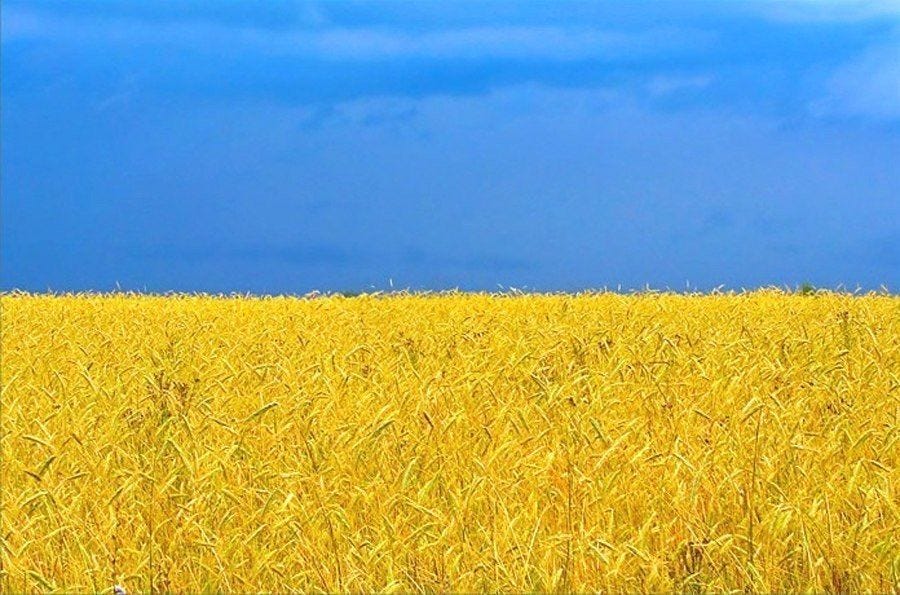
In thinking through more of this, I messaged a good friend of mine from college who, after graduation, spent 17 years living in St. Petersburg, Russia, as a missionary and business woman in the early 90s and 00s. Though I’ve been to Europe, I’ve never been to any states of the Former Soviet Union, so I thought she might be able to lend some perspective on the people and situation there (I’m quoting her here anonymously, using the name her Russian friends called her). I hope you’ll find (as I did) that her insights and answers to my questions add much color to the happenings in Ukraine.
Craig: I’ve been thinking of you in recent days with all that’s going on in Ukraine. Would love your thoughts as I continue to try to understand all that’s going on over there.
Bruchka: Oh my word. I feel shell shocked in an odd sort of way. I have several friends there, and one Russian friend is part Ukrainian and four generations of her family are fleeing right now from the Eastern part to the Western part, but where do you go?
This is so stunning and so shocking. I knew Putin was capable of a lot of evil because of how he presided over the Second Chechen War (very cruel war), but I couldn't imagine he would be this brazen. I think the lack of leadership in the world now and our weakness has emboldened him in a way that has made him drunk with power.
Russia has a history of this. He has been engaging in info wars for eight years since he took the Crimea, and a lot of Russians believe the lies about the genocide in the eastern part. It's not true that they are systematically carrying out a genocide, but he's built up a narrative that now he thinks can justify this. But to go so far as to say that they don't deserve to be a nation because they were a fabrication of the Soviet Union and the Bolsheviks is ludicrous and deranged. They have their own language and culture and were fighting for a long time to be free, and they became a country before the 1922 formation of the Soviet Union. Plus, they've been independent for 30 years, and that qualifies for world recognition as an independent nation, just like Estonia (20 years of independence between the World Wars).
Craig: Did you ever make it to Ukraine? Are there that many differences between the Ukrainian people and the Russian people? How do you think about the two?
Bruchka: I did in 1998. The Ukrainians are a more southern agricultural culture, so their families tend to be healthier (big picture in comparison with Russia), and they are more open and friendly when you encounter them out and about. The churches are bigger there with more active members than in churches in Russia. They are more trusting of the West (obviously) and they don’t want heavy-handed government. Lots of similarities, too, but they are different.
Craig: What would the similarities be? How did the two countries relate as part of the Soviet Union?
Bruchka: One similarity is that they both share the history of their origin, Kievan Rus. The languages are 60 percent similar. The most similar language to Russian is Belorussian, and after that, it's Ukrainian.
They (Ukraine) tried to be free of outside rule before the Soviet Union was formed and officially formed a republic in 1917, before the Bolsheviks decided to make them a separate republic inside the Soviet Union. But Putin sure tried to revise that history this week.
They became the breadbasket of the Soviet Union because the land there is unusually rich. After the Russian Revolution, the Bolsheviks seized power there and in Russia and drafted Ukraine into the Union. Both have Eastern Orthodoxy as their main religion.
Craig: The most I knew about Ukraine was that it is the breadbasket (comparable to our Midwest) of the Soviet Union. I bet it's beautiful there.
Bruchka: It’s so gorgeous. When I woke up on the train going there, I could hardly believe my eyes. Sunflowers as far as the eye could see. The fruit there tastes extra good because the soil is so rich. But they have a ton of corruption there as well. That’s one major reason they don’t qualify to be in NATO.
Craig: Should they be in NATO? They can't be more corrupt than some other members.
Bruchka: No, they shouldn’t be in NATO because they have so much corruption. They do need to get a handle on that. Having them in NATO would be like the missiles pointed at the U.S. during the Cuban missile crisis; Ukraine would be similar to Cuba in becoming a potential aggressor and aiming missiles. It’s fair to say that should have been the compromise. We were provoking Russia with that; there is no doubt. Only Belarus would have been between him (Putin) and NATO.
There is a particular amount of corruption in Ukraine and Russia that boggles the mind. It permeates the daily lives of regular people. They apparently have not set up a truly Democratic and free system. I don’t claim to be an expert on Ukraine or its government, but I think it had a very long way to go before it could have qualified.
Craig: What should the U.S. do? What should the U.S. have done?
Bruchka: We should help in some way, but not with our troops in country. Far too dangerous for us to be head to head as nuclear powers. The best thing we could have done would have been to remain strong to be a deterrent, and we should have remained energy independent and should have been exporting to Europe so they would not be so dependent on Russia. Germany gets 55% percent of its oil and gas from Russia so it can’t stand up to them like it should. If we were still exporting we wouldn’t have emboldened and enriched him so much (we imported about 300 million barrels of oil from Russia this past year) and we would have helped Europe be less dependent on him. Biden lifted the sanction of Nord Stream 2 his second day in office or so, but that should not have been lifted.
I think our weak and horrendous withdrawal from Afghanistan emboldened Putin as well. But at the end of the day, he is so far gone in his delusion about Ukraine not deserving to be an independent country that I think he is using that as a justification (one of many) for this.
Craig: How do you see this resolving? What are the possibilities in your mind?
Bruchka: I am really worried now. I think they (Ukraine) need divine intervention to succeed at this war against Russia. Really and truly. Russia may power over them (and will militarily), but can they succeed in holding it and setting up a new government? The massive scale of this with explosions near Kiev and taking the airport so fast are incredibly aggressive and shocking. He is going for the jugular by attacking Kiev.
Finland survived WWII on the wisdom of their great generals (particularly Mannerheim) and really and truly the intervention of God. I have heard men tell stories about this and it was God who protected them. They were too small and had far too little firepower.
From a human perspective, he (Putin) probably will take those two separatist areas at the very least. I hope and pray he doesn’t get anything else but right now that will take an act of God
Craig: Where does it stop for Putin? Does he keep going if unchecked? I've read that Putin may be going actually crazy to a degree. Do you have a sense of that?
Bruchka: I think Putin has taken a turn for the worse. I watched the whole hour of his address. It was bizarre. I’ve never seen him so bold in making despotic ideas known. He knows no one is really willing to stand up to him. The president of Finland said his behavior has changed. I can see that in his address. He rambled and sighed more than I’ve ever seen and he was so calculated and cold.
I'm super-worried about the Baltics because number one, Estonia, is my favorite place on earth, and also because they are officially in NATO. Will Putin try to use them to bait us all into a world war? Right now, I feel like nothing is off the table because of the way he carried out multiple surprise attacks Thursday and did it so brazenly, even on the capital. So you feel like you can't discount anything he might do. It felt before like there was some checked power there, but now it feels like he has unleashed pure evil on the Ukrainians.
Once again, human depravity reminds us that ours is not an existence of peace with wars that occasionally break out; rather, we live in a world constantly at war with (very) few fleeting moments of peace.
And yet, despite so much confusion during times like these, the Scriptures resound with the truth that God is still on His throne and is not wringing His hands in worry about His world. On the contrary, Psalm 2:1-6 says,
“Why do the nations rage
and the peoples plot in vain?The kings of the earth set themselves,
and the rulers take counsel together,
against the LORD and against his Anointed, saying,‘Let us burst their bonds apart
and cast away their cords from us.’He who sits in the heavens laughs;
the Lord holds them in derision.Then he will speak to them in his wrath,
and terrify them in his fury, saying,‘As for me, I have set my King
on Zion, my holy hill.’”
Have mercy on all of us, God. Come quickly, Lord Jesus. Holy Spirit, grant us peace.
Post(erity): “Creed or Chaos?”
Each week, I choose a post from the past that seems apropos of something (of course, you’re always welcome to search the archives yourself whenever you like).
This week’s Post(erity) post, “Creed or Chaos?”, comes from October 2007 and highlights a few quotes from writer Dorothy Sayers’ little 100-page book on war, written at the height of World War II. An excerpt:
“War is a judgment that overtakes societies when they have been living upon ideas that conflict too violently with the laws governing the universe. People who would not revise their ideas voluntarily find themselves compelled to do so by the sheer pressure of the events which these very ideas have served to bring about.”
Only three quotes in the post, but all well-worth the click. Read the whole post.
Peaches’ Picks
Now that we’re two months into our New Year’s resolutions, it seems a good time to revisit our habits and consider anew how to reinforce good ones and break bad ones. So, Atomic Habits by James Clear, is our book selection for next month. The book looks to be an easy but helpful read, so watch for our in-depth review at the end of March. In the meantime, why not pick up a copy yourself and read along with us?
Fresh & Random Linkage
“Britney Spears Inks Landmark Publishing Deal for Tell-All Book” - Details on my next memoir project. (Just kidding, but it’s hilarious to think about, isn’t it?)
“The Anxious Leg Bounce: Why It Happens and How to Deal with It” - I don’t think of myself as a particularly anxious person, but apparently my legs do.
“Lavish Roman Mosaic is Biggest Found in London for 50 Years” - Stuff like this is always cool.
Until next time.



